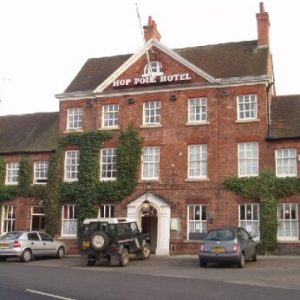 At the September meeting of the Edwinstowe Historical Society, Linda Hardy, a member of the Sherwood Forest Trust, gave a detailed account of the introduction of hop growing into England and the reason for the popularity, locally, in the 1700’s. Previously the national drink had been ale (a brew produced from malt without hops) but the introduction of hops preserved the beer. The growing method was to train hops to grow up poles.
At the September meeting of the Edwinstowe Historical Society, Linda Hardy, a member of the Sherwood Forest Trust, gave a detailed account of the introduction of hop growing into England and the reason for the popularity, locally, in the 1700’s. Previously the national drink had been ale (a brew produced from malt without hops) but the introduction of hops preserved the beer. The growing method was to train hops to grow up poles.
Hop Pole Hotel, Ollerton. “Wikimedia Commons”
Extending from Retford to Southwell, known as the “North Clay” district, 35 parishes including Ollerton and Edwinstowe, contained hop yards. Records indicate that in 1881, Edwinstowe’s hop yards were sited on land off Mill Lane and Boy Lane. A noted hop grower was the Earl of Scarborough, at Rufford Abbey. Hop markets or fairs were held in Retford, Tuxford and Ollerton and attracted merchants from various parts of England.
Hop growing declined towards the end of the 19th century, possibly due to the advent of the railways, and changes in taste. The only reminders now of a once flourishing trade are signs to be found on some hostelries, i.e. the Hop Pole in Retford, and the Hop Pole in Ollerton.
Enquiries continue to be received, one from the leader of Souchez Historic Committee in France. His enquiry related to Lieutenant Sidney Reuben Pinder of the Royal Flying Corps who, sadly, lost his life during the first world war when he was shot down at Marquillies in France, on 19th February, 1918. Sidney was born in Edwinstowe on 31st August 1889. He went to Canada in 1911 but as soon as war was declared he left his job and enlisted with the 3rd Canadian Tunnelling Company. Tributes will be paid in November 2022 to the allied airmen buried in the Cabaret Rouge Cemetery at Souchez, France. Sidney is one of them.
 Edwinstowe Historical Society
Edwinstowe Historical Society